
As the Kingdom of Saudi Arabia’s far-reaching economic and social reforms under Vision 2030 continue at pace, it would be understandable commentators have pondered whether the Saudi people are onboard with the changes sweeping the land at breath-taking speed. However, recent polling research from the Serco Institute, in collaboration with polling experts at Kantar, confirms high levels of support amongst the Saudi public for the Vision 2030 reforms transforming the country.
The polls, which questioned Saudis aged 18-54, covered several key areas relating to Saudi reforms including the relationship between public-private enterprises, Saudisation, the future role of women in the workplace and revealing the vast majority of Saudi people are aligned with the Government’s goals.
Commenting on the research, Ben O’Keeffe, Serco Institute Deputy Director, said:
“Saudi Arabia is in the midst of transformation – more rapid and sizeable than any we have seen a country undertake for decades. From women in the workplace, to a growing global presence and a diverse private sector, this research indicates that on many of the key aspects of this change, the people of Saudi Arabia are on board.
“Although driven by a desire to diversify its economy, the Vision 2030 reforms go well beyond just some financial tinkering – they reach deep into the roots of the country, but the unique insights of our data show it is a vision shared with the people of the Kingdom.”
Overall, the survey showed that the KSA public are supportive of the broad strategic goals of Vision 2030 and of the government. 88% of Saudis agree that one of Vision 2030’s central policy aims - diversification of the Saudi economy - is important to the Kingdom, with two-thirds (66%) agreeing it is ‘very important’.
Key to many of these goals and the overall Vision 2030 programme is the involvement of the private sector: indeed, one of Vision 2030’s stated aims is to raise the private sector’s share of GDP from 40% to 65% by 2030, and to increase foreign direct investment from 3.8% to 5.7%[1].
Moreover, Riyadh is looking for opportunities to expand private sector involvement in a host of public service sectors, including health; transport; energy and housing. This, too, would appear to be supported by the Saudi population: more than three-quarters (76%) of respondents in our survey agreed the KSA Government should work with international businesses to improve government services and drive down costs. This suggests Saudis recognise the enormous potential for a fruitful partnership between the public and private sectors in the Kingdom.
The polling results, however, suggest any public-private partnership in Saudi Arabia must be in service of Riyadh’s strategic objectives and within the parameters set by the Saudi Government. Nearly eight in 10 (79%) Saudis believe it is important for international businesses operating in Saudi Arabia to reserve a certain percentage of jobs for KSA nationals, in line with Vision 2030’s Saudisation scheme. An even higher proportion (81%) believe multinationals with operations in KSA must have a physical presence or office in the country, indicating that the KSA Government’s rule (although recently loosened[2]) excluding companies without Saudi-based headquarters from public contracts is popular and supported by the general population in Saudi Arabia.
A similarly large majority of respondents (85%) also agreed the transition to green and renewable energy, another key aim of the Vision 2030 reforms, is important to Saudi Arabia; one may reasonably assume, therefore, that the reform programme and its central tenets are supported by the vast majority of the KSA population.
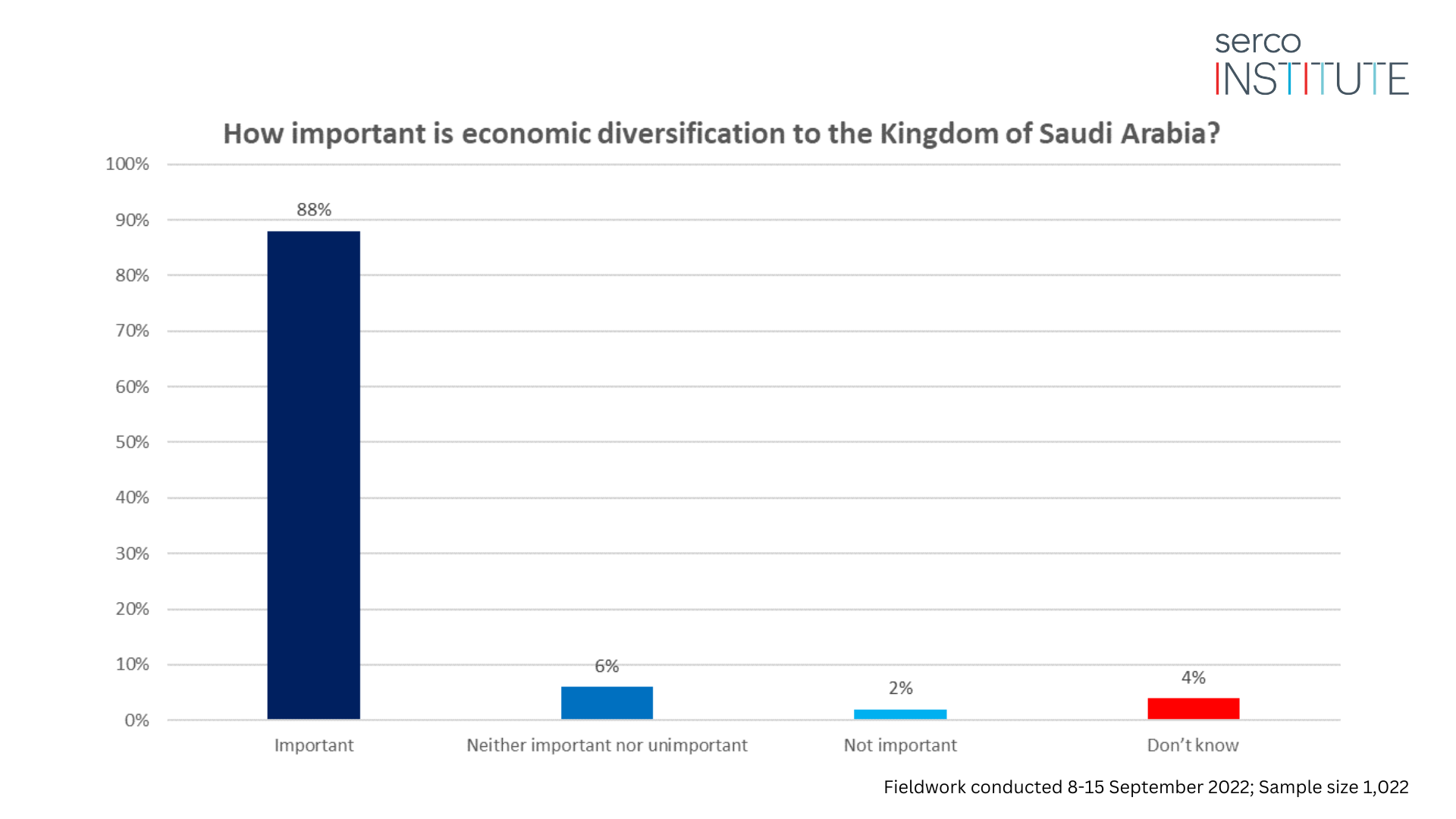
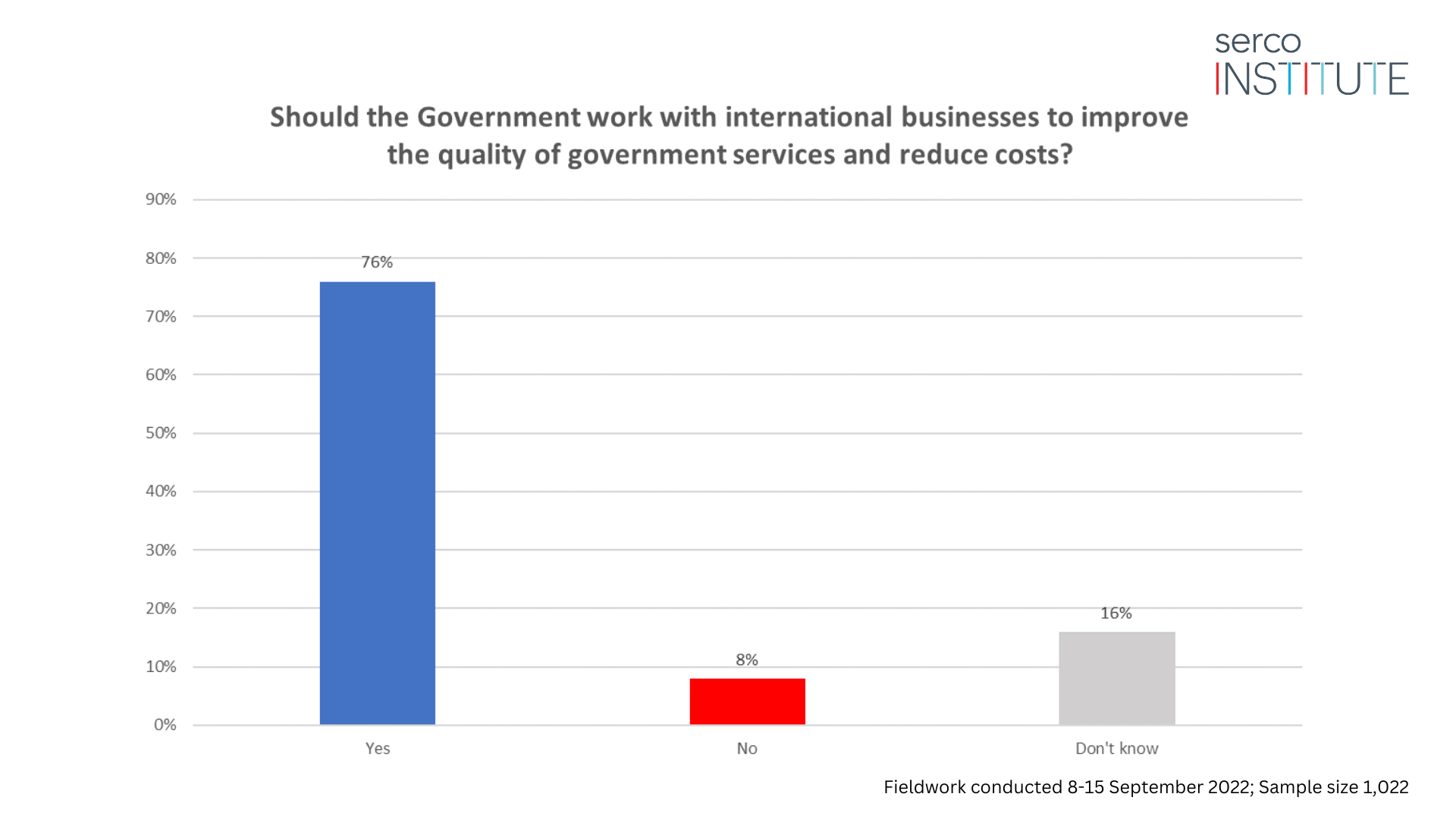
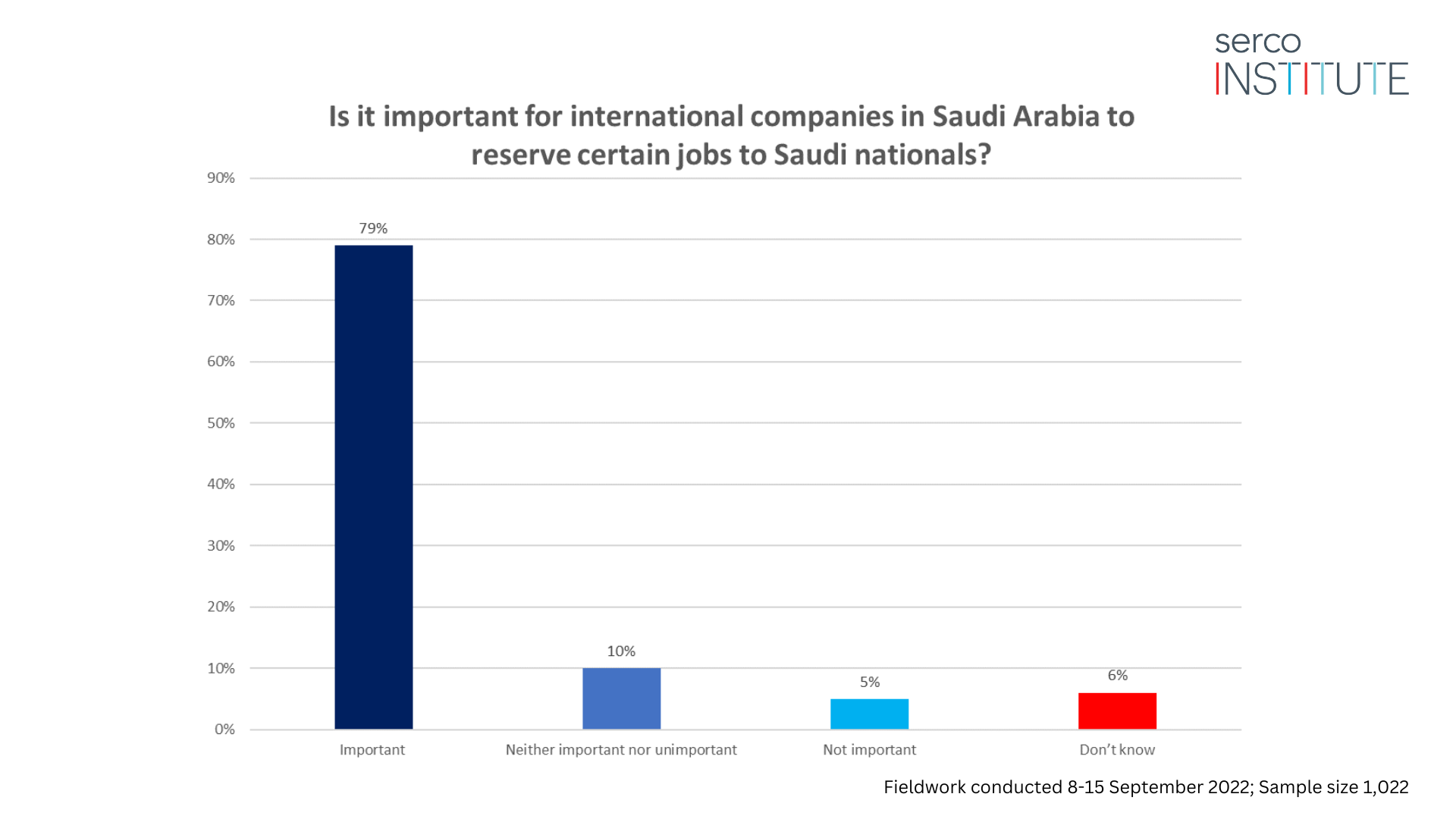 The Tourism Sector
The Tourism SectorTourism is another major priority under Vision 2030: by some distance, the tourism sector was perceived to have the most potential by the Saudi public. 43% of respondents identified tourism and leisure as the sector holding the most opportunity for KSA with more than half (55%) of Saudis ranking it as either the first or second most promising sector for the country. With both Saudi Arabia only opening its borders in 2019 to invite non-religious tourists in for the first time and the Saudi Government designating tourism a major driver of future economic growth and job creation[3], there are boundless opportunities for Saudis to benefit from an anticipated boom in tourist arrivals in the coming years.
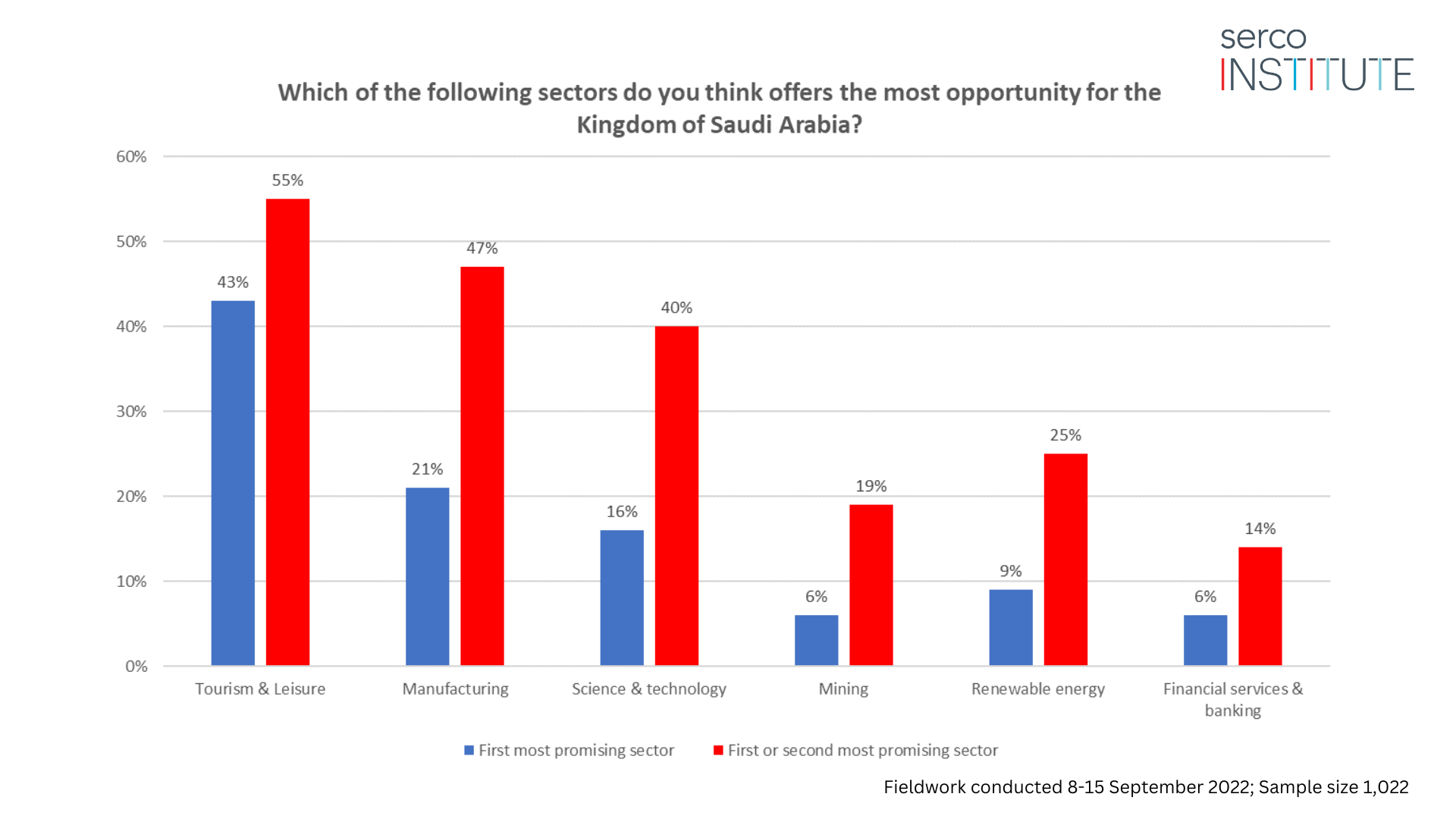 Social Reform
Social Reform Among Vision 2030’s most eye-catching commitments have been the changes to the position of women in Saudi society: many reforms in recent years pertaining to women, such as the end of gender segregation in hospitality settings[4], have attracted the attention of the international community. In particular, the employment of women is a priority for the Saudi Government under Vision 2030, with government policy encouraging women into the workforce in increasing numbers. These changes, it would seem, enjoy the support of the public: nearly nine in 10 (87%) respondents in our poll agree opportunities for women in Saudi workplaces are increasing, suggesting the measures which have seen the labour force participation rate among women in Saudi Arabia rise to over a third (37%) are broadly popular and are seen to be working[5].
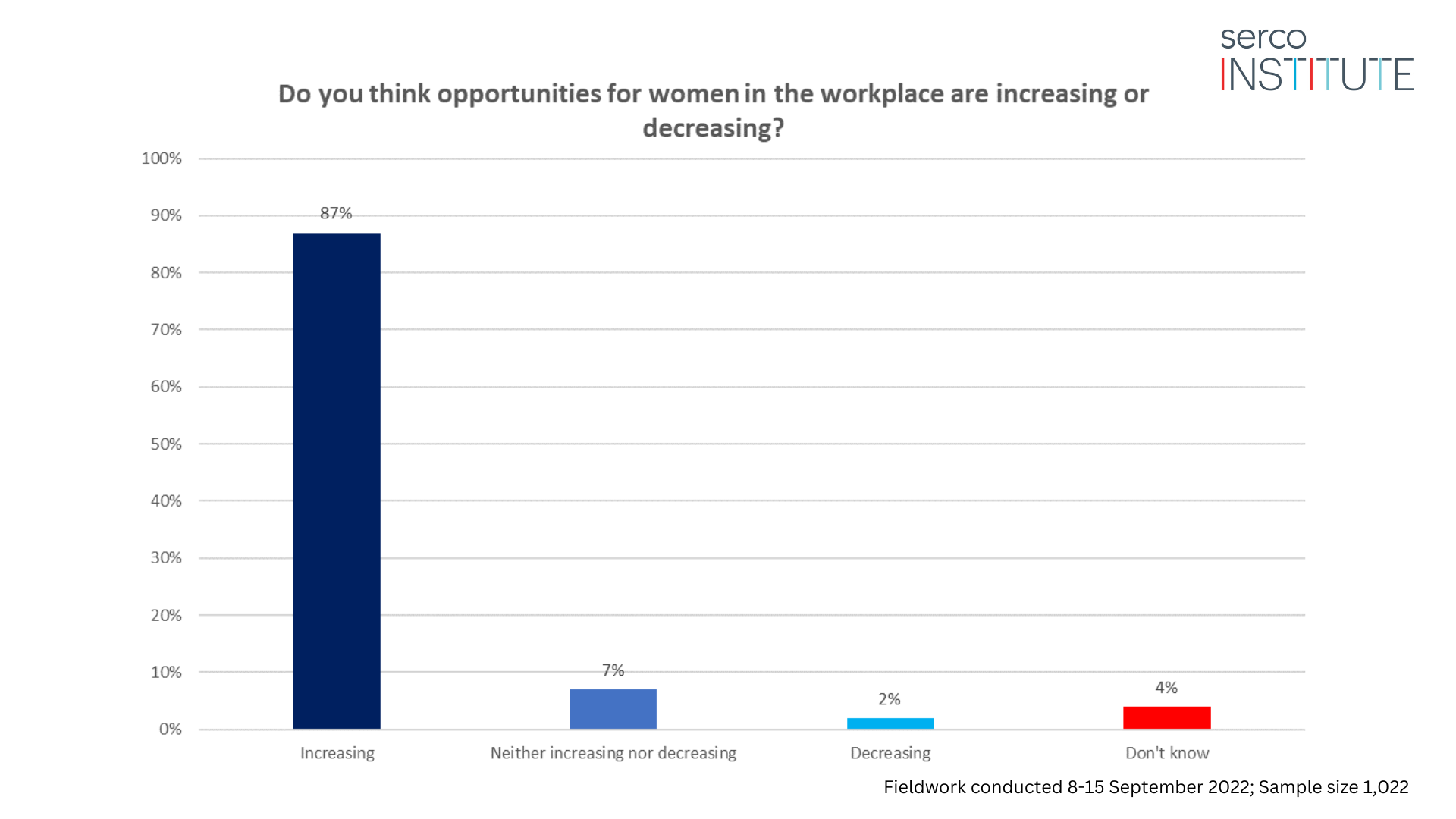 In summary: Saudi & Success – the Delivery will Decide
In summary: Saudi & Success – the Delivery will DecideTransformation is tricky, to say nothing of the radical, far-reaching reforms of the kind the Kingdom of Saudi Arabia is undergoing. Vision 2030 is arguably the most ambitious national investment and modernisation programme seen for decades.
There is also an exciting role for the private sector to play in Saudi Arabia as it modernises and develops into a world-leading commercial, tech and aviation hub, but any international companies seeking to do business in the Kingdom must work to deliver the Saudi Government’s strategic priorities, within the conditions set by Saudi authorities.
Delivery will, of course, be the ultimate measure by which it is judged a success. In the Saudi public’s eyes, however, the current direction of travel seems to be one which they support.
Notes to editors:
Note on polling methodology
The survey was conducted via online panel between 8-15 September 2022 with a sample size of 1,022 adults living in the Kingdom of Saudi Arabia. Differential response rates from different demographic groups were taken into account. The data is weighted to the profile of all adults in Saudi Arabia aged 18-54.